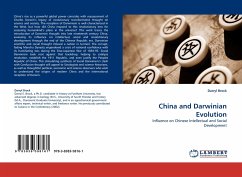China's rise as a powerful global power coincides with reassessment of Charles Darwin's legacy of evolutionary transformative thought on science and society. The reception of Darwinism is well characterized in the West, but how did China respond to this revolutionary lens for assessing humankind's place in the universe? This work traces the introduction of Darwinist thought into late nineteenth century China, assessing its influence on intellectual, social and revolutionary development through the end of the Chinese Republic era. Darwinian scientific and social thought infused a nation in turmoil. The corrupt, fading Manchu Dynasty engendered a crisis of national confidence with its humiliating loss during the Sino-Japanese War of 1894-95. Social Darwinism took root against that backdrop, helping to catalyze revolution, establish the 1911 Republic, and even justify the Peoples Republic of China. This stimulating synthesis of Social Darwinism's clash with Confucian thought will appeal to Sinologists and science historians, as well as thoughtful political, economic and science observers who wish to understand the origins of modern China and the international reception of Darwin.
Bitte wählen Sie Ihr Anliegen aus.
Rechnungen
Retourenschein anfordern
Bestellstatus
Storno








